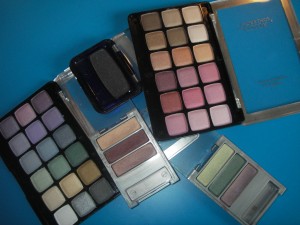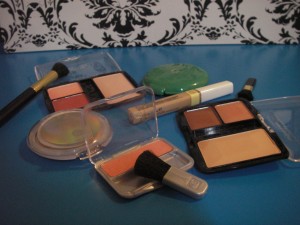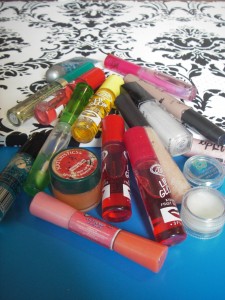Many of us overlook the importance of keeping our make-up clean. Everyday we smudge germ-riddled cosmetics around our eyes, nose and mouth without a second thought. Implementing a few simple steps will help prevent infection and could keep you from getting sick.
We will start with the most dangerous oversight, your eyes. Eyeliner pencils can be used right until they become a nub if you work hard to keep them clean and bacteria-free. All you need to do is dip them in rubbing alcohol after every sharpening. Don’t forget to clean your sharpener with rubbing alcohol as well. If you use a make-up brush to apply your eyeliner, you will need to clean them once a week or so with a mixture of mild, anti-bacterial soap and warm water. Insure that you have allowed them to dry completely before using or storing. Unless otherwise specified, all make-up application brushes can be cleaned this way.
If used daily, you can probably hold on to your eye shadow until you have used it all up, that is, unless it changes in colour, odour or texture, as this can be a sign that a bacterial infiltration has occurred. In any case, powder eye shadow should be discarded after two years and cream eye shadow after one year from the time of initial use. Keeping your eye shadow clean is all in keeping your brushes clean, so make sure you clean your application brushes on a regular basis.
Sadly, mascara can rarely be kept until the end of the tube. Apparently it is the most deadly thing you will stick in your eye all day. Most professionals would recommend not using your mascara after the second or third month from the time you opened the package. Luckily, there are ways to extend the life of your mascara from the second month to the third. Number one, never, I mean never, pump your mascara. This only encourages a bacterial invasion. Number two, you can clean the tightening ring on the tube of the mascara with a damp cloth every time you slip and get mascara on the threads. This will ensure a tight seal, keeping air and bacteria out. Number three, if your make-up budget is feeling exceedingly strict, you can clean the mascara brush. This should be done at least once a week. You can use either Vaseline or a creamy make-up removing product. This can get messy, as you must use a clean cotton cloth. Paper products are not to be used because they tend to leave fibres behind. My sources recommend using rags made from cut-up old t-shirts that aren’t acceptable for donation.
The next aspect we will cover is your skin. Although using dirty make-up on your skin is less dangerous than using it on your eyes, it is still an important topic. Although the bacteria in contaminated skin make-up are less likely to get into your system through your eyes, nose or mouth than other products, it can cause other problems, such as skin irritations, like acne, for example. Keeping your liquid foundation clean and germ-free is all in how you apply it. You can either clean your make-up sponge or pad after every use or use a new one every time. These products should be discarded by their expiration date, which is usually about six months from the time you buy it.
Powder, cover-up type foundations also carry an expiration date, but their shelf life is twice as long as that of a liquid foundation, about one year. This type of make-up usually comes with an application pad, which can be cleaned in the same way as any other make-up brush, unless otherwise directed on the packaging. This becomes increasingly important when using a compact product where the application pad is stored directly on top of the make-up.
The practices for keeping your cream or powder blush clean and safe to use are the same as those for your eye shadow. Another tip is to make sure the container holding the make-up closes with a tight seal and does not have any cracks in it, as this allows bacteria to breach its perimeter.
Lastly we will talk about our lips. The ingredients in lipstick can go bad and it is usually quite obvious when this happens. There will be a marked difference in appearance, smell or texture. If this happens you should discontinue use of the lipstick. Before this happens you can keep your lipstick clean by either spraying it with or dipping it in an alcohol solution and whipping it off with a paper towel, or buy using a frequently cleaned or disposable brush to apply it to your lips. Some women swear by keep their lipstick in the refrigerator to prolong its shelf life.
The methods used to keep your lip-gloss clean are similar to those used with your mascara. Avoid using a pumping action and keep the tightening ring clean and free from stray lip-gloss to keep a tight seal. You can also clean the applicator. This can be done with a mild anti-bacterial soap and warm water. If your lip gloss does not come with an applicator, the rules are similar to those for lipstick. You can use a frequently cleaned or disposable brush or be very diligent about keeping any part that comes in direct contact with your mouth clean and sanitized.
It is highly important to wash your hands with soap and water before applying your make-up, whether you will be using your fingers as application tools or not. Another important habit to get into is cleaning all of your make-up after any illness or infection you experience. The number one, most important thing to remember is; never share your make-up!



